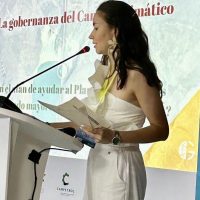
[Listen to an audio version of this blog entry here.]
When one thinks of Colombia’s Boyacá department, if one thinks of it at all, it tends to conjure up images of the awe-inspiring Andes, clean, cool country air and the odd superstar cyclist.
It’s generally not thought of as a tropical paradise. That’s because, for the most part, it’s not one.
First impressions: Santa María on a sunny day.
Right as rain
Yet, Boyacá does have its lower-lying areas and, as Colombia is in the tropics, with that comes hotter weather, day and night (the sun can and does show its force during the day in the loftier parts, as I discovered in Tibaná recently).
One of those balmier Boyacá places is the small town of Santa María in the department’s southern Neira Province. Warm it may be (at an altitude of 850 metres, the average low is 23 degrees Celsius), its tropical monsoon climate means it gets plenty of rain. I just so happened to plan my brief visit at the start of its wet season. Oh well.
Thus, the idea of a sun-kissed trip to Santa María, bronzing oneself up, didn’t really materialise. It was far from cold, though, of course. And the sun did peep through on occasions. In further mitigation, the heaviest, most intense rain seemed to fall at night. Indeed, that helped to make things more relaxing in a way, listening to the rain hammer down on tin roofs whilst cosily tucked up in bed.
Santa María gets its fair share of rain, especially between April and November.
Alongside that, for some relative peace and quiet compared to the Bogotá bustle, it certainly comes good.
Now some of you may be aware that I do like to get it in some hillwalking where possible and on that front Santa María has various options.
‘Perhaps the townsfolk figured it would simply be a waste of time and money building a big church, competing in vain with the beauty that nature has to offer all around.’
La Cristalina is an «official» — i.e. signposted, for the most part anyway — roughly four-kilometre (one-way, from the town centre) trek through rolling forested hills, incorporating a nice view of the town from the south and leading to a small waterfall.
Close to the beginning and at the end of this walk, the largely fast-flowing river does provide some refreshing bathing spots. These are well-received when the sun is out.
A dam good place
Immediately to the north of the town there is an alluring peak that I had to try to master. Alas, with just vague instructions on how to arrive at the summit, I only managed to get about three-quarters of the way, wading through some thick grassland en route, before encountering some rather dense forest. I figured it was best to make a safe retreat at that stage. At least I made it far enough so as to get a good view of Santa María well below.
River wild: Trekking La Cristalina.
I subsequently discovered some other walks along quiet country lanes, passing through both farmland and forests. (A special mention to 76-year-old and father of a five-year-old daughter, Gonzalo, who generously fed and watered me with guarapo [a sometimes fermented sugarcane juice, in case you’re wondering] and arepas after I stumbled upon his secluded homestead on one of the various hills I wandered up. The refreshments were well received following about six hours of ascending and descending.)
A view of that alluring peak to the north of Santa María.
Santa María itself, unlike most towns in these parts, is devoid of an impressive Catholic church on its main plaza. For sure, it has a church, it’s just not that aesthetically pleasing. Perhaps the townsfolk figured it would simply be a waste of time and money trying to compete with the beauty that nature has to offer all around. If that is the case, I’m in agreement.
Top man: Gonzalo came good with copious amounts of guarapo and a couple of arepas.
As for a place to lay one’s head, for a small settlement, it has, somewhat surprisingly, at least five accommodation options. I was told this is a legacy of the construction of the nearby and visually stunning La Esmeralda Dam, built in the 1970s for hydroelectric power.
Spying Santa María from the hills to the north.
I opted for Hotel La Posada, with rooms from a very reasonable 25,000 COP per night. Going by outward appearances, the other hotels may be a little fancier but, I must confess, I didn’t check them out. This was for the simple reason that Don Jaime and his wife Margarita, La Posada’s owners, are a delightful elderly couple so I was content to stay put.
In fact, Don Jaime insists I should return, preferably in the dry season (I don’t mind the rain, Jaime!), as he wants to bring me to his farm on the outskirts of the town, where he herds about 80 cattle.
For the old farmhand that I am, it’s a very tempting invitation. As the saying goes, you can take the man out of the farm but you can’t take the farm out of the man.
I guess it’s why I have a liking for these rural retreats.
*There are almost hourly buses to Santa María from Bogotá’s northern bus terminal (Calle 193) with Flota La Macarena and Flota Valle de Tenza the main operators. A one-way ticket costs 35,000 COP during normal times (expect to pay more during holiday and festival periods). The journey time is about 3.5 hours.
_______________________________________________________________
Listen to Wrong Way’s Colombia Cast podcast here.
Facebook: Wrong Way Corrigan — The Blog & IQuiz «The Bogotá Pub Quiz».




Comentarios